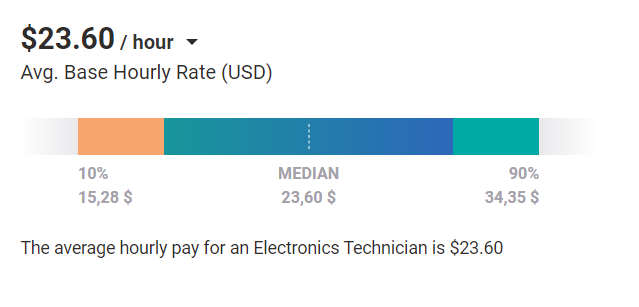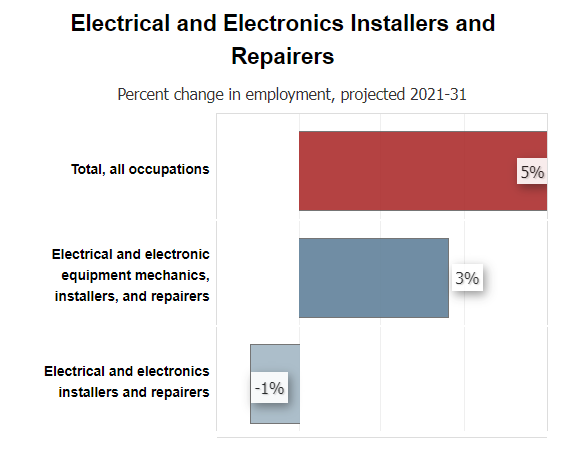Career Spotlight: Electronic Systems Technician

Job Description
Electronic systems technicians are professionals responsible for installing, maintaining, repairing, and troubleshooting electronic systems, including communication, control, and computer systems. They work in a variety of industries, including manufacturing, telecommunications, transportation, and government. In this article, we will provide detailed information about the job of an electronic systems technician, including their requirements, responsibilities, additional duties, and required skills.
General Information
Electronic systems technicians work with various electronic devices, such as control systems, telecommunications equipment, and computer systems. They may work in a variety of environments, including offices, factories, and laboratories. The primary goal of an electronic systems technician is to ensure the proper functioning of electronic devices and systems.
Requirements
To become an electronic systems technician, an individual typically needs an associate's degree in electronics or a related field. Some employers may also require professional certifications, such as the Certified Electronics Technician (CET) certification. The certification is available through the International Society of Certified Electronics Technicians (ISCET) and requires passing an examination. Additionally, some employers may require several years of relevant work experience in the industry.
During World War II, electronic systems technicians played a vital role in developing and maintaining electronic equipment for military applications, such as radar systems and communication equipment.
Main Responsibilities
The main responsibilities of an electronic systems technician include installing, maintaining, repairing, and troubleshooting electronic systems. They may also be responsible for designing, testing, and modifying electronic systems to meet specific requirements. Other duties may include:
- Installing and configuring electronic systems, such as control systems, communication systems, and computer systems.
- Maintaining and repairing electronic systems to ensure their proper functioning.
- Troubleshooting electronic systems to identify and resolve problems.
- Designing and modifying electronic systems to meet specific requirements.
- Testing electronic systems to ensure their proper functioning.
- Documenting procedures, processes, and results of electronic systems maintenance and repair.
- Providing technical support to end-users of electronic systems.
Additional Duties
In addition to their main responsibilities, electronic systems technicians may also be responsible for other duties, including:
- Analyzing and interpreting technical documents, schematics, and diagrams.
- Collaborating with other professionals, such as engineers, to design and modify electronic systems.
- Providing training and support to end-users of electronic systems.
- Identifying and evaluating new technologies and trends in the field of electronics.
Skills
Hard Skills
- Knowledge of electronic systems, including control systems, communication systems, and computer systems.
- Proficiency in reading and interpreting technical documents, schematics, and diagrams.
- Familiarity with electronic testing equipment, such as oscilloscopes and multimeters.
- Ability to troubleshoot and repair electronic systems.
- Knowledge of programming languages, such as C++ and Java.
- Knowledge of circuit board design and manufacturing processes
- Familiarity with safety protocols
Soft Skills
- Strong communication skills to interact with other professionals and end-users of electronic systems.
- Critical thinking and problem-solving skills to identify and resolve issues with electronic systems.
- Attention to detail to ensure the proper functioning of electronic systems.
- Time management skills to meet project deadlines.
- Flexibility and adaptability to work in a fast-paced environment and handle unexpected challenges.
- Teamwork and collaboration skills to work effectively with other technicians, engineers, and professionals in a variety of settings.
- Customer service skills to work with clients and end-users of electronic systems and to provide technical support.
In the 1950s and 1960s, the development of the transistor and other electronic components led to the widespread use of electronic devices and systems in a variety of industries, such as telecommunications and computing.
Salary

Average Salary and Hourly Pay
According to Payscale, the average salary for an electronic systems technician in the United States is $55,000 per year. However, the salary range can vary between $37,000 to $82,000 per year depending on experience, location, and industry. The hourly pay for an electronic systems technician ranges from $15.00 to $34.00 per hour, with the average hourly pay being $23.60 per hour.
The Bureau of Labor Statistics (BLS) reports that the median annual wage for electrical and electronics installers and repairers, including electronic systems technicians, was $61,760 in May 2021. The lowest 10 percent earned less than $37,050, and the highest 10 percent earned more than $100,300.
Factors That Influence Earnings
Several factors can influence an electronic systems technician's earnings, including experience, location, industry, and education.
Location: The location of the job can also affect the technician's earnings. Those working in urban areas and large cities typically earn more than those in rural areas or small towns.
Education and experience: Electronic systems technicians with higher education and more experience typically earn more than those with less education and experience.
Certifications: Certifications can also impact the technician's earnings. For example, those with CompTIA A+ certification or Microsoft Certified Systems Engineer (MCSE) certification may earn higher salaries.
Ways to Improve Earnings
There are several ways electronic systems technicians can improve their earnings, including:
- Education and training: Pursuing advanced degrees, certifications, or additional training can help technicians develop specialized skills and knowledge, making them more valuable to employers.
- Experience: Gaining more experience in the field can help technicians become more efficient, productive, and valuable to employers.
- Professional networking: Building relationships with other professionals in the industry can help technicians discover new job opportunities and negotiate better salaries.
- Negotiation: When negotiating salary, technicians should focus on their skills, experience, and the value they bring to the company.
Additional Benefits
Job Security: As technology continues to evolve, there will likely be a growing demand for skilled electronic systems technicians who can install, maintain, and repair complex electronic systems. This means that individuals in this field may enjoy greater job security than those in other industries.
Opportunities for Advancement: Electronic systems technicians who have strong technical skills and a solid work ethic may have opportunities to advance into supervisory or managerial roles within their organizations. This can come with increased responsibilities and higher pay.
Flexibility: Many electronic systems technicians work in industries that require 24/7 operation, such as healthcare, transportation, and manufacturing. This can lead to flexible scheduling options, including evening or overnight shifts, which can be attractive to some individuals.
Continuing Education: Electronic systems technology is constantly evolving, which means that individuals in this field must stay up-to-date with the latest trends and technologies. Many employers offer continuing education and training opportunities, which can lead to personal and professional growth.
Work Variety: Electronic systems technicians may work in a variety of industries, including healthcare, telecommunications, manufacturing, and transportation. This can provide individuals with opportunities to work on different types of electronic systems and gain a wide range of experience.

Photo: Jcomp/Freepik
The development of the integrated circuit in the 1960s revolutionized the electronics industry, making it possible to create small, powerful electronic devices such as microprocessors.
Job Environment
Description of Settings
Electronic systems technicians work in a variety of settings, including manufacturing plants, hospitals, transportation companies, and telecommunications companies.
In manufacturing plants, these technicians are responsible for maintaining and repairing production equipment, such as conveyor systems, robotics, and programmable logic controllers.
In hospitals, electronic systems technicians may work on medical imaging equipment, such as CT scanners and MRI machines, as well as patient monitoring systems.
In transportation companies, electronic systems technicians may work on avionics systems in aircraft, navigation systems in ships, and control systems in trains.
In telecommunications companies, these technicians may work on phone systems, data networks, and cable TV systems.
Description of Tools
Tool | Function |
Multimeter | Measures voltage, current, and resistance |
Oscilloscope | Measures and analyzes electronic signals |
Soldering Iron | Joins two pieces of metal or wire together by melting a filler metal (solder) into the joint |
Wire Strippers | Removes insulation from the end of wires to make connections |
Pliers | Grips, bends, and cuts wires or other small components |
Screwdrivers | Tightens or loosens screws on electronic components |
Power Supplies | Provides a steady and regulated supply of electrical power to electronic components |
Logic Probes | Tests the digital logic states of electronic circuits |
Signal Generators | Produces a variety of electronic signals for testing and troubleshooting electronic systems |
These tools are essential for electronic systems technicians to perform their job duties effectively and efficiently.
Education
To become an electronic systems technician, individuals typically need to complete a formal education and training program. The specifics of the education and training required can vary depending on the employer and the specific job duties involved, but generally include the following:
High School Diploma
As mentioned, a high school diploma is typically required for electronic systems technician positions. In addition to the coursework mentioned, students may benefit from classes in computer science and mechanical drawing, as well as developing good communication and problem-solving skills. High school students can also participate in extracurricular activities, such as robotics clubs or electronics hobby groups, to gain hands-on experience and demonstrate their interest in the field.
Post-Secondary Education
Certificate and diploma programs in electronics technology typically cover topics such as circuit analysis, digital electronics, and microprocessors. Some programs may also include courses in communications systems or industrial electronics. Associate degree programs may also include general education coursework, such as English or social science classes. In addition to classroom instruction, students in these programs typically have access to hands-on training in laboratory settings.
On-the-Job Training
On-the-job training for electronic systems technicians can vary depending on the employer and job duties involved. Some employers may provide training on specific equipment or systems, while others may provide more general training on safety and maintenance procedures. On-the-job training can also provide opportunities for technicians to learn from more experienced colleagues and develop their skills through practical experience.
Professional Certifications
Professional certifications can be an important way for electronic systems technicians to demonstrate their knowledge and expertise to employers. The International Society of Certified Electronics Technicians (ISCET) offers several certifications, including the Certified Electronics Technician (CET) and Certified Electronics Technician Associate-Level (CETa) certifications. The Electronics Technicians Association (ETA) offers similar certifications, including the Associate Electronics Technician (CETa) and Electronics Technician (CET) certifications. These certifications typically require passing an exam and meeting certain education and experience requirements.
Bachelor's Degree
A bachelor's degree is the most common education requirement for electronic systems technicians. A bachelor's degree in electronic engineering technology or a related field can prepare individuals for a career in this field. Typically, a bachelor's degree program takes four years to complete and includes coursework in electrical circuits, digital electronics, computer programming, and communication systems.
Master's Degree
While not always required, a master's degree in electronic engineering technology or a related field can enhance an electronic systems technician's career prospects. A master's degree program typically takes two years to complete and includes coursework in advanced electronic systems design, signal processing, and digital communications.
Ph.D.
A Ph.D. can be useful for those who want to pursue a career in research or academia. A Ph.D. program typically takes four to five years to complete and involves in-depth research in a specific area of electronic engineering technology.
Professional Associations
There are several professional associations that electronic systems technicians can join to enhance their careers. These include the Institute of Electrical and Electronics Engineers (IEEE), the Association for Computing Machinery (ACM), and the International Society of Automation (ISA). These associations provide networking opportunities, professional development resources, and access to industry events.
The growth of the electronics industry in the latter half of the 20th century led to an increased demand for skilled electronic systems technicians who could design, install, and maintain complex electronic systems and equipment.

Photo: Freepik
Career Paths
Electronic systems technicians are highly skilled professionals who work with electronic devices and systems. As their skills and experience grow, there are several career paths that electronic systems technicians can pursue.
Ways of Career Development
One of the most common ways for electronic systems technicians to advance their careers is through experience and training. As technicians gain more experience, they can take on more complex projects or move into management or supervisory roles. Many employers offer opportunities for training and professional development, including workshops, conferences, and continuing education courses.
Subfields and Specializations
Electronic systems technology is a broad field that encompasses many different subfields, including telecommunications, automation and control, and biomedical technology. Technicians can specialize in a particular subfield based on their interests and career goals. Electronic systems technicians can also specialize in a particular area of expertise within their subfield. Specialization can help technicians become experts in a particular area, which can lead to higher pay and more job opportunities.
Subfields | Specializations |
Telecommunications | Wireless communications, satellite communications, fiber optic cable installation |
Automation and Control | Robotics, process control systems, building automation |
Biomedical Technology | Medical imaging equipment, diagnostic equipment, patient monitoring systems |
Power and Energy | Power generation systems, renewable energy systems, electrical distribution systems |
Computer Systems | Computer hardware, computer networking, cybersecurity |
Audio and Video | Audio equipment, video equipment, broadcast systems |
Military and Defense | Electronic warfare systems, radar systems, communication systems |
Keep in mind that this is not an exhaustive list, and there may be other subfields and specializations within electronic systems technology. It's also worth noting that some specializations may overlap across different subfields, and technicians may have skills and knowledge that apply to multiple areas of expertise.
Alternative Careers and Similar Jobs
There are several alternative careers and similar jobs that electronic systems technicians can pursue. For example, they may become electrical or electronics engineers, who design and develop electronic equipment and systems. They may also become technical writers, who create manuals and other documentation for electronic systems and products. Another possible career path for electronic systems technicians is to become computer network architects, who design and build data communication networks. They may also become computer hardware engineers, who design and develop computer hardware components.
Other potential alternative careers and similar jobs for electronic systems technicians include:
- Control Systems Technician: Control systems technicians work with electronic systems that are used to control and monitor industrial processes, such as manufacturing lines, water treatment plants, and power generation facilities.
- Instrumentation Technician: Instrumentation technicians install, calibrate, and maintain electronic instruments and devices used in scientific research, medical equipment, and industrial processes.
- Robotics Technician: Robotics technicians work with electronic systems that control robots used in manufacturing, healthcare, and other industries.
- Telecommunications Technician: Telecommunications technicians install, maintain, and repair electronic systems used for communication, such as telephone, internet, and cable television networks.
- Renewable Energy Technician: Renewable energy technicians work with electronic systems used to generate energy from renewable sources, such as
- Industrial Automation Technicians: These technicians work in manufacturing plants and are responsible for maintaining, troubleshooting, and repairing electronic systems used in industrial automation, such as programmable logic controllers (PLCs), sensors, and other control systems.
- Computer Network Technicians: These technicians work in IT departments or for technology companies and are responsible for maintaining, troubleshooting, and repairing computer networks and systems, including routers, switches, servers, and other network devices.
- Audiovisual Technicians: These technicians work in the entertainment industry, installing, maintaining, and troubleshooting electronic systems used in audiovisual equipment, such as sound systems, lighting systems, and video displays.
- Security Systems Technicians: These technicians work for security companies or in-house security departments, installing, maintaining, and troubleshooting electronic systems used in security systems, such as access control systems, alarm systems, and video surveillance systems.
- Medical Equipment Technicians: These technicians work in healthcare settings, installing, maintaining, and repairing electronic systems used in medical equipment, such as MRI machines, X-ray machines, and other medical devices.
- Avionics Technicians: These technicians work in the aviation industry, installing, maintaining, and troubleshooting electronic systems used in aircraft, such as navigation systems, communication systems, and flight control systems.
Job Market

Source: U.S. Bureau of Labor Statistics
Demand for electronic systems technicians is expected to remain steady in the coming years. According to the U.S. Bureau of Labor Statistics (BLS), employment of electrical and electronics engineering technicians (which includes electronic systems technicians) is projected to show little or no change from 2021 to 2031.This reflects the relatively stable demand for these workers across different industries, with some areas of growth in emerging technologies and industries.
Factors That Contribute to the Stable Demand
There are several factors that contribute to the stable demand for electrical and electronics engineering technicians, including electronic systems technicians:
- Increasing use of electronic devices and systems: As technology continues to advance, electronic devices and systems are becoming more prevalent in everyday life. This includes everything from smartphones and computers to medical equipment and industrial control systems. As a result, there is a growing need for technicians who can install, maintain, and repair these complex systems.
- Evolving industries: Many industries are undergoing transformation as they adopt new technologies and business models. This includes areas such as renewable energy, smart manufacturing, and e-commerce. As these industries grow and evolve, there is a need for skilled technicians who can help design and implement electronic systems to support these new processes and technologies.
- Replacement of retiring workers: The BLS notes that many electrical and electronics engineering technicians are nearing retirement age, which is leading to a need for new workers to replace them. This helps to create job opportunities for younger workers and ensures that there is a steady supply of skilled technicians to support various industries.
- Emerging technologies: Emerging technologies such as the Internet of Things (IoT), artificial intelligence (AI), and 5G networks are creating new opportunities for electronic systems technicians. These technologies require skilled technicians who can design, install, and maintain the complex systems that underpin them.
The job outlook for electronic systems technicians may vary depending on their area of specialization and geographic location. For example, technicians with expertise in renewable energy systems may see stronger job growth due to increasing demand for sustainable energy sources. Technicians working in rural or remote areas may also have more job opportunities due to a shortage of qualified workers in these regions.
Job Satisfaction
Electronic systems technicians may face various challenges at work, including:
- Troubleshooting complex systems: Electronic systems technicians often work with sophisticated and complex electronic systems, which can be challenging to diagnose and repair when they fail.
- Working under time pressure: When a system fails, there may be significant pressure to restore it quickly to minimize production downtime or safety risks.
- Keeping up with evolving technologies: As technology continues to advance, electronic systems technicians must continually learn and adapt to new tools, equipment, and systems.
- Communicating with non-technical personnel: Electronic systems technicians may need to explain technical issues or solutions to non-technical personnel, such as managers or customers, which can be challenging.
- Managing multiple projects: Electronic systems technicians may be responsible for multiple projects simultaneously, which can require excellent organizational and time-management skills.
- Working in hazardous environments: Depending on the industry, electronic systems technicians may be exposed to hazardous materials or work in environments that pose safety risks, which can be challenging.
Benefits
Job Security: As technology continues to evolve, there will likely be a growing demand for skilled electronic systems technicians who can install, maintain, and repair complex electronic systems. This means that individuals in this field may enjoy greater job security than those in other industries.
Opportunities for Advancement: Electronic systems technicians who have strong technical skills and a solid work ethic may have opportunities to advance into supervisory or managerial roles within their organizations. This can come with increased responsibilities and higher pay.
Flexibility: Many electronic systems technicians work in industries that require 24/7 operation, such as healthcare, transportation, and manufacturing. This can lead to flexible scheduling options, including evening or overnight shifts, which can be attractive to some individuals.
Continuing Education: Electronic systems technology is constantly evolving, which means that individuals in this field must stay up-to-date with the latest trends and technologies. Many employers offer continuing education and training opportunities, which can lead to personal and professional growth.
Work Variety: Electronic systems technicians may work in a variety of industries, including healthcare, telecommunications, manufacturing, and transportation. This can provide individuals with opportunities to work on different types of electronic systems and gain a wide range of experience.
Advantages | Disadvantages |
Job stability | Work can be physically demanding |
Hands-on work | Exposure to hazardous materials |
Opportunities for advancement | Potential for high stress |
Variety of work environments | Need for continuous learning and training |
It's worth noting that this is not an exhaustive list and that the advantages and disadvantages of being an electronic systems technician may vary based on factors such as the industry, company, and individual preferences.

Photo: Senivpetro/Freepik
Government Programs
The United States Department of Labor offers several apprenticeship programs for electronic technicians, such as the Electronic Technician Apprenticeship Program. These programs provide a combination of on-the-job training and classroom instruction, and can lead to nationally recognized credentials.
The Department of Defense also offers technical training programs for electronic systems technicians in the military, such as the Navy's Electronics Technician (ET) rating and the Air Force's Avionics Systems Specialist career field. These programs provide comprehensive training in the design, installation, maintenance, and repair of electronic systems used in military applications.
The Workforce Innovation and Opportunity Act (WIOA) provides federal funding to states to help job seekers access employment, education, and training services. WIOA-funded training programs may include training for electronic systems technicians.
The Trade Adjustment Assistance (TAA) program provides job training and other benefits to workers who have lost their jobs or had their hours reduced due to increased imports or outsourcing. This program may provide training for electronic systems technicians in certain circumstances.
The Veterans Affairs (VA) offers education and training benefits for veterans and eligible dependents, such as the Post-9/11 GI Bill and the Vocational Rehabilitation and Employment program. These benefits can be used to pursue education and training in the field of electronic systems technology.
- The median annual wage for electronic systems technicians is $61,760.
- Factors that influence earnings include location, education, experience, and certifications.
- To become an electronic systems technician, individuals typically need to complete a formal education and training program that includes a high school diploma, post-secondary education, on-the-job training, professional certifications, and continuing education.
- Career paths for electronic systems technicians include advancing through experience and training, specializing in a particular subfield, and pursuing management or supervisory roles.
- Professional associations such as the IEEE, ACM, and ISA provide networking opportunities, professional development resources, and access to industry events.
- The demand for electronic systems technicians is expected to remain steady in the coming years, with little or no change in employment from 2021 to 2031.
- Benefits of the job include job security, opportunities for advancement, flexibility, continuing education, and work variety.
- Government programs, such as apprenticeship programs, technical training programs in the military, the Workforce Innovation and Opportunity Act, the Trade Adjustment Assistance program, and the Veterans Affairs program, can provide training and benefits for electronic systems technicians.
FAQ
What does an electronic systems technician do?
An electronic systems technician designs, installs, maintains, and repairs electronic systems and equipment, such as telecommunications systems, computer networks, medical equipment, and industrial machinery.
What kind of education and training do I need to become an electronic systems technician?
Most electronic systems technicians have an associate's degree in electronics technology or a related field.
What kind of industries employ electronic systems technicians?
Electronic systems technicians can work in a variety of industries, such as telecommunications, aerospace, defense, manufacturing, and healthcare.
How much do electronic systems technicians earn?
The median annual wage for electronic systems technicians is $61,760.